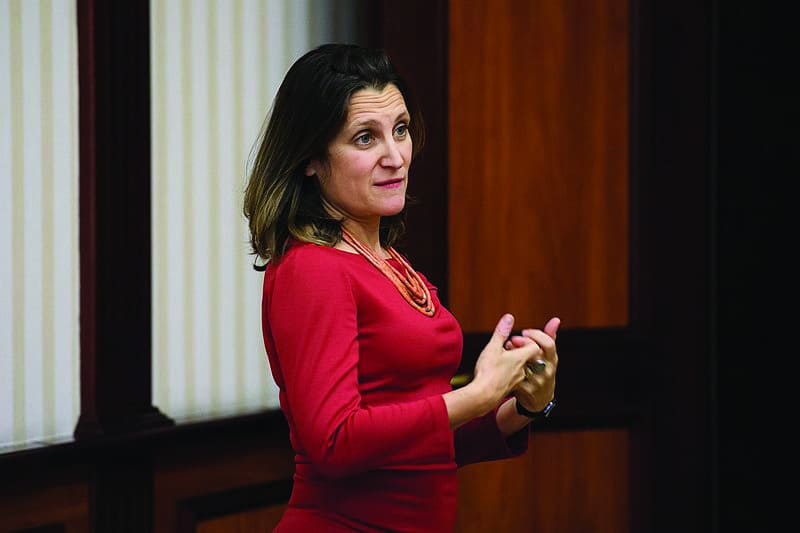As Canada’s first female finance minister, Freeland has a complicated legacy

Imperial girlboss energy
by Gillian Massie and Sara Birrell
With a highly decorated history and a diverse range of professions (journalist, author, politician), Chrystia Freeland is hardly unqualified for her new role as finance minister. But what can Canadians expect from the first woman to take this role?
With the hasty exit of Bill Morneau in the wake of this summer’s WE charity scandal, Chrystia Freeland becomes the first female finance minister in Canada. It’s another step towards a more gender-neutral government, although putting more women in positions of power doesn’t necessarily translate into an improvement in the material conditions of the lives of ordinary women.
Canada’s finance minister is now more essential than ever amidst the COVID-19 crisis, as this is the person responsible for ensuring that the restructuring of Canada’s economy is equitable and fair. Freeland does not have a typical finance background, which may be considered risky, however many observers say she is more likely than Morneau to be liberal with social spending, something that will benefit the Canadian economy more than austerity.
Freeland began her career as a journalist, receiving her education from Harvard University, then continuing to the University of Oxford as a Rhodes Scholar. She worked for legacy media organizations such as the Washington Post and the Economist, later taking on senior roles at the Globe and Mail as Deputy Editor, and for Financial Times as Deputy Editor and U.S managing author. She also published two books, Sale of the Century: The Inside Story of the Second Russian Revolution, and Plutocrats: The Rise of the New Global Super-Rich and the Fall of Everyone Else, for which she received the Lionel Gerber Prize and the National Business Book Award. At a book signing for Plutocrats she met Justin Trudeau, which began their partnership.
In 2013, Freeland left the writing world to pursue a career in politics and had her first major success by winning the party nomination for the University-Rosedale area, opening the doorway to her career in Parliament. After winning re-election for the University-Rosedale area, she was welcomed into the Cabinet as the new Minister of International Trade in 2015.
Freeland negotiated the Comprehensive Economic Trade Agreement (CETA) Canada’s free trade agreement with the European Union, a keystone of her political career which was successfully signed on October 30, 2016, following a dramatic walkout by Freeland. She also re-negotiated the North American Free Trade Agreement (NAFTA), which is now known as the United States-Mexico-Canada Agreement (USMCA), and was signed successfully at the end of 2019.
In 2017 she was appointed Minister of Foreign Affairs, where she demonstrated her willingness to advance Canadian imperialism and meddle in the domestic affairs of other American states, contrary to the OAS charter.
Under Freeland’s leadership as Foreign Affairs Minister, Canada helmed the Lima Group, an organization of American states whose stated purpose was to interfere in Venezuela’s domestic affairs. As the South American petrostate’s economy flagged to crisis levels and President Nicolas Maduro failed to maintain the popularity of Hugo Chavez, who died in 2013, the Lima Group nations saw the opportunity to extinguish the remnants of Chavismo and the Bolivarian revolution. Freeland, along with the rest of the Lima Group, backed a failed coup by opposition leader Juan Guido, falsely claiming that Venezuela’s 2017 elections were fraudulent.
Freeland has also been called out for failing to denounce her grandfather, Michael Chomiak, a Ukranian nationalist and Nazi collaborator who was the chief editor of an antisemitic newspaper. While none of us, including Freeland, are culpable for the actions of our ancestors, all of us, including Freeland, are responsible for denouncing Nazism and antisemitism.
In 2019, Freeland was appointed by Trudeau as the Deputy Prime Minister of Canada and Minister of Intergovernmental Affairs. Her most notable contribution within the last year has been her battle to lower U.S. tariffs on steel and aluminum.
Coming back up to date, a few weeks ago she was sworn in as the first female Finance Minister in Canada. With all things considered, there is a huge list of pros and cons.
Being a highly decorated, experienced, and popular candidate, Freeland has proven her own individual strength as a political leader. Her competency is not in doubt. However, many of her decisions, like the decision to back the Lima Group, show an anti-democratic bent that Canadians should be concerned about, especially considering Freeland’s star is likely to only keep rising.









